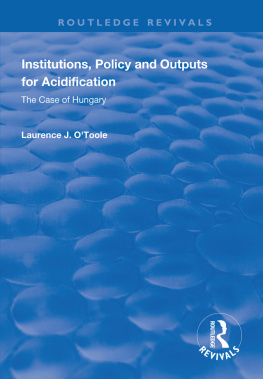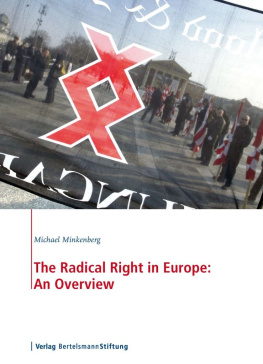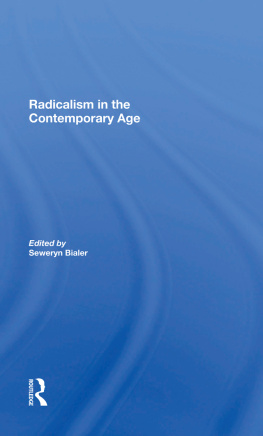Copyright
Authors, editors, 2015
LHarmattan Publishing, 2015
EAN Epub : 978-2-336-84253-0
LHarmattan France
5-7 rue de lEcole Polytechnique
75005 Paris
T. : 33.1.40.46.79.20
Email:
LHarmattan Italia SRL
Via Degli Artisti 15, 37
10124 Torino
T. : (39) 011.817.13.88 / (39) 348.39.89.198
Email:
Publishing director: Gyenes dm
Volumes may be ordered, at a discount, from:
LHarmattan Knyvesbolt | Prbeszd Knyvesbolt |
1053 Budapest, Kossuth L. u. 14-16. | 1085 Budapest, Hornszky utca 20. |
Tel.: (+36-1) 267-5979 | Tel.:(+36-1) 445-2775 |
www.harmattan.hu | www.konyveslap.hu |
Cover design: Jen Ujvry
Layout: Kllai Zsanett
Printing and binding: Robinco Kft.
Director: Kecskemthy Pter
FOREWORD
The studies in the present volume are based on the empirical data of a recently completed MyPlace project (Memory, Youth, Political Legacy And Civic Engagement, FP7-SSH-2010-1, GA Number: 266831). According to the objective of the four-year-long project, completed with the participation of researchers from 14 countries, the research concept how young peoples social participation is shaped by the shadows (past, present and future) of totalitarianism and populism in Europe did not focus on the comparison of national political cultures and heritages based on different classifications but on the pan-European approach. The empirical methods adapted to the concept (surveys, qualitative interviews and ethnographic case studies) have contributed to the examination of the social participation of young people in a historical and cultural context, and to the learning of meanings attributed to related concepts.
Three aspects of editing were taken into account when compiling the studies primarily based on Hungarian research findings. Our intention was to include research data regarding the other countries participating in the project as well, in addition to domestic data. Another aspect was to include analyses based on methods using not only the large sample survey in the volume but also qualitative interviews and ethnographic case studies. The third aspect was the presentation of Hungarian political culture relevant to radicalism and populism as well as some of its characteristics. The reason for this latter aspect was to provide a frame of reference for those readers who are unfamiliar with the broader political socialization environment of young people in Hungary.
Following the above editorial principles, the first study of the volume (by Domonkos Sik) describes the different countries and regions separated based on their economic well-being on the basis of empirically constructed political cultural ideal types, using the database of the whole survey, then anticipates radicalization in the individual countries and in Europe based on the results.
The second study (by Gyorgy Csepeli and Gergo Prazsak) presents the structure of authoritarianism typical of the present Hungarian adult society on the one hand, and on the other hand, it has tested on the database of MyPlace survey whether the impact of social context or that of the region prevails more in explaining the dominant attitudes in the formation of authoritarianism.
The third study (by Zoltan Berenyi) discusses a possible explanation of the failure of the Hungarian democracy and its operational dysfunctions the controllig role of citizens does not prevail in the absence of a strong civil society in the period following the change of regime.
The fourth study (by Zoltan Berenyi and Istvan Muranyi) analyses the relationship between social indicators and the support of political extremism on the entire sample of the survey research, based on the concept of fragmented political socialization.
The fifth study (by Istvan Muranyi) examines the role of socio-cultural and socio-psychological factors influencing the national attitude of the Hungarian youth in two residential environments characterized by significantly different socializing conditions.
One of the two ethnographic case studies closing the volume (by Ilona Lahdelma) describes a specific part of the Hungarian civil society based on the presentation of a tradition preserving association in eastern Hungary characterized by apolitical radicalism.
The site of the second case study (by Florian Sipos) is also the north-eastern region, where it was investigated what kind of social participation (activity) characterizes the political socialization of Roma young people studying in a Buddhist school, in the disadvantaged and at the same time prejudiced environment against the Roma population.
I am grateful to the Hungarian research team of MYPLACE and to the invited authors (Gyorgy Csepeli, Ilona Lahdelma, Gergo Prazsak) for their studies.
I am also grateful to the consortium leaders defining the concept of the project and coordinating the MYPLACE research (Prof. Hilary Pilkington, Prof. Gary Pollock) for the opportunity to publish this volume.
Debrecen, 10 May 2015
Istvn Murnyi
editor
DOMONKOS SIK
Patterns of political culture in Europe alienation, indifference, emancipatory and populist activism
The results of the European Parliamentary elections of 2014 revealed an unexpected increase of the popularity of extreme right and Eurosceptic parties. According to these results the stability of the European democratic consensus does not seem to be as secured as before. Once again, the question concerning the potential emergence of antidemocratic tendencies has to be posed. While political transformations may be analyzed from many perspectives, the following paper is based on a phenomenological approach in a sense that it focuses on political culture. The notion of political culture, originally elaborated by Almond and Verba, refers to the knowledge about the political system, the attitudes towards it and the political behaviour patterns as well (Almond and Verba 1963). In this sense the analysis of political culture focuses on the actors interpretation of the political world and their reaction to the perceived social and political difficulties at the same time.
In order to grasp not only the existence but also the potential of the emergence of antidemocratic tendencies, the political culture of the youngest generation of citizens were systematically examined in the frames of project MYPLACE. Croatia, Denmark, Estonia, Finland, Georgia, the former East and West Germany, Greece, Hungary, Latvia, Portugal, Russia, Slovakia, Spain and the UK two contrasting locations were chosen in each of these countries to represent divergent idealtypical social, economic and political constellations. From each location a representative sample of 600 young people was taken. This way, instead of a representative sample of the countries, the representative sample of their border cases was grasped. In a different manner such sample also provides the opportunity to analyze general European trends. The analysis of the border cases focusing on the extremities instead of the average allows us to examine those social spheres, where transformations occur, therefore to grasp dynamism instead of stability. In this sense our survey serves the purpose of revealing latent potentials not only on the level of its target group but also on the level of sampling.










